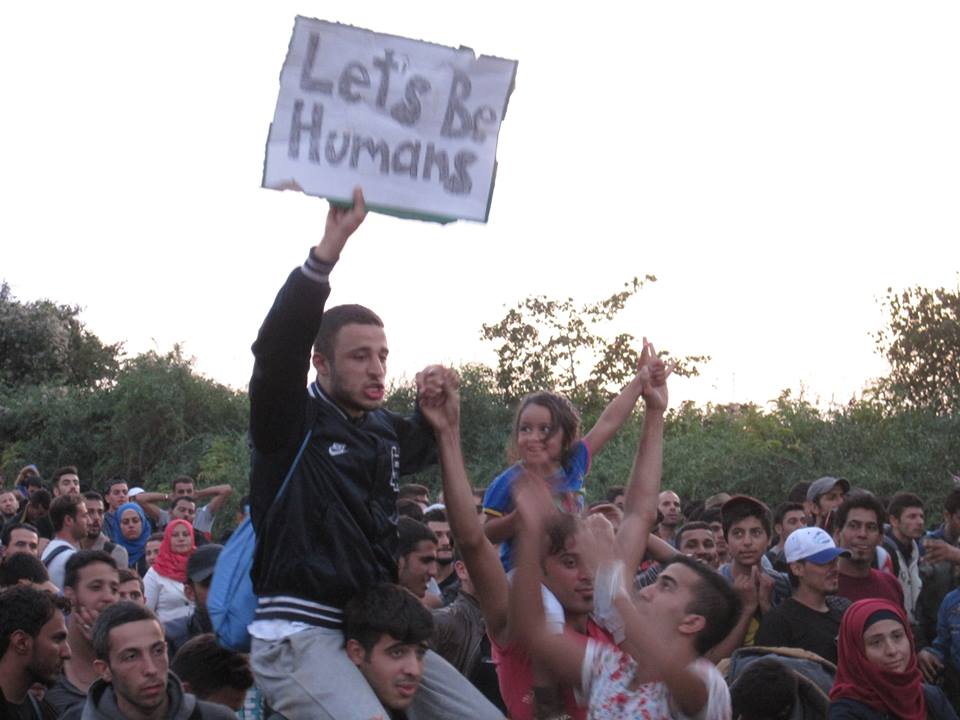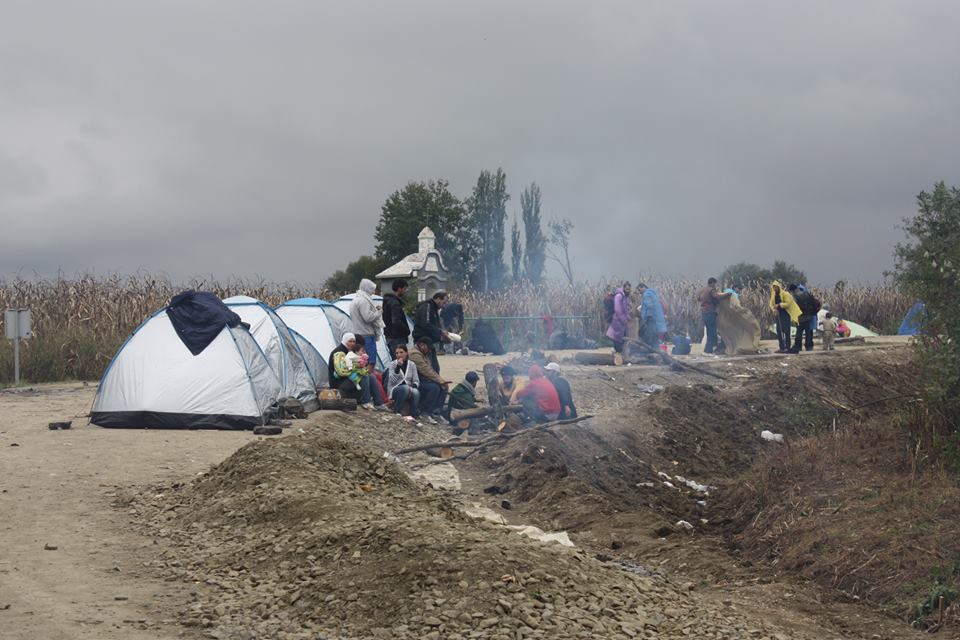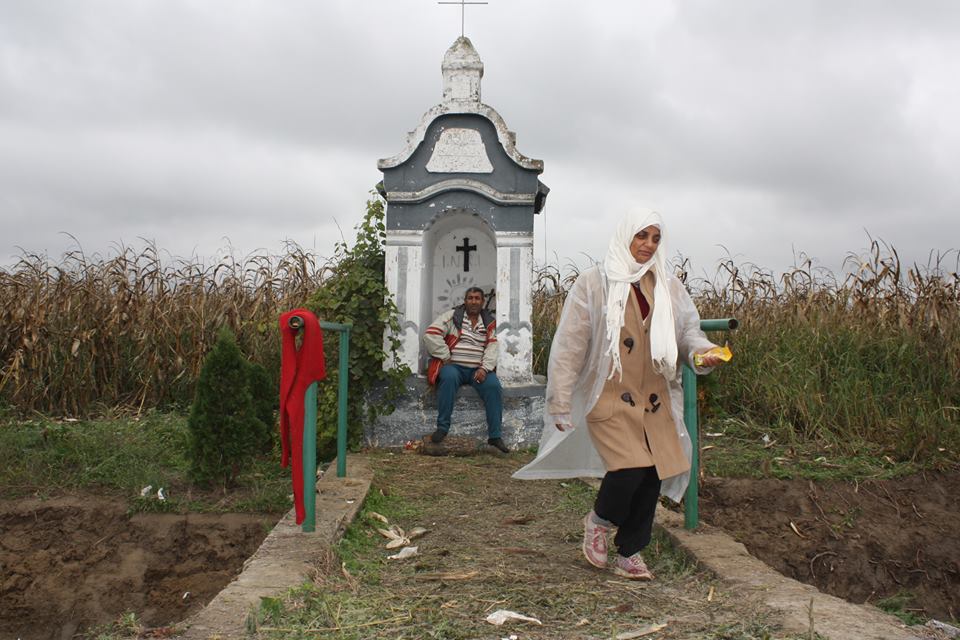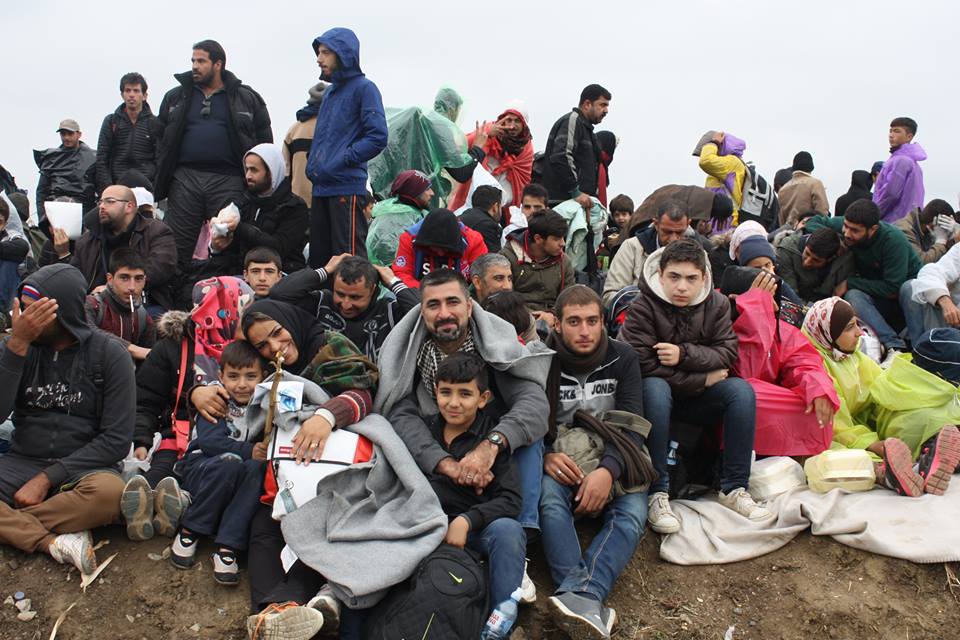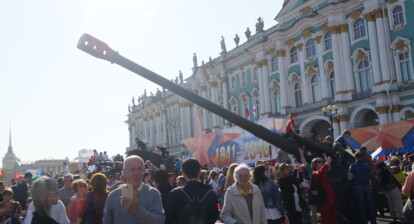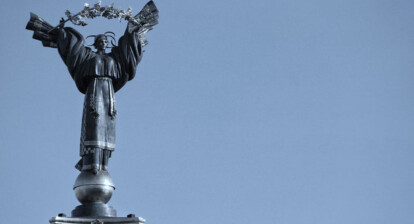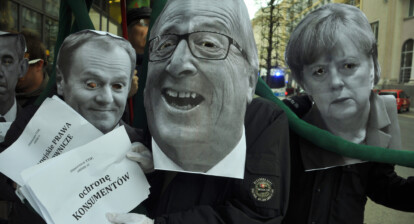Hundreds of thousands of refugees have passed through Serbia this year. Two Serbian activists, the Kontrapress journalist Žarka Radoja (40) and the psychologist and therapist Ana Perović (27) tell about their first-hand encounters with refugees on wheelchairs and everyday work…
Recognising the Human Faces Amidst Europe’s Refugee Crisis
In the last couple of months the face of Europe has constantly and rapidly been changing. As with numerous other events that were to shape the history, it seems almost impossible to speak about the enormous inflow of refugees into Europe, without coloring our statements with our bias, one way or another. Dissonant voices, whether they denounce Middle Eastern refugees as a threat to the European traditions and good order, or as the rightful punishment and logical consequence of Western military and economic policies, all tend to forget, however, that they are speaking about human beings in the first place.
Voices from the Refugee Crisis
We have been reading a lot lately about a mass of people coming to Europe, but we can seldom hear who these people really are. Since both of you have been in direct contact with the refugees, could you tell us who are the media talking about actually?
Žarka: I have spent three months between Southern and Northern Serbian borders and in Belgrade parks. The people I encountered are the refugees primarily from Syria, Iraq and Afghanistan. There are many families with small children. On the Berkasovo crossing between Serbia and Croatia on the 22nd of October I couldn’t manage to take a single photo without at least two children in it. I have never seen that many children in my life. There are many things we cannot see on the field, but what we can claim with certainty is that the vast majority of them is coming from the war zones and hence are refugees. During all these months I have met only a couple of people from Lebanon and Algeria, who can be considered economic migrants. But their number is almost negligible.
Ana: We have to question the unanimity of this population, because every attempt to represent them uniformly has the aim to mark them as different from us. We ascribe diversity to ourselves. These people have a shared experience. They have all passed a road from a place where their life was endangered in one way or another. A part from that, they are as diverse as the population of this or any other city. There are lawyers, doctors, hair-dressers, bakers, mechanics.
Acknowledging Diversity Amidst the Refugee Crisis
There are men, women and children, homo-, hetero- and transsexuals. We need to acknowledge this diversity. We can note certain trends, surely. People coming from Afghanistan tend to be male, often minors. There are many Kurds that fled Iraq and often travel in groups, with families. The women older than 60 usually stayed at home, but apart from that even the age differs from grandparents to small infants and unborn children. But if we start seeing them as a uniform group, we risk considering them different than ourselves, which basically there are not.
Žarka: Yes, people from Afghanistan, for example, travel by foot most of the way. What fascinates me over and over again is seeing people in wheelchairs. We know the hardship of the roads they had to pass, and we know that somebody had to accompany them all that way. What I see as a unifying category is their will power.
Ana: Exactly, there are non-demographic categories that unite them. There is a strong determination to accomplish their goal. And there is an incredible sense of dignity in a difficult situation that they share.
Žarka: I remember a scene from Kanjiža (Northern Serbia), in the moment when everybody knew that Hungary will close the borders soon. I’ve seen a guy on the side of the railways fixing his hair with hair-gel. Two days ago I have seen a man shaving before crossing the Croatian border, with his feet in garbage. In all their misery, they all want to look nice when entering the next country on their way. I see it as a sign of dignity and respect for the place they are going to.
Making a Difference on the Ground
Žarka, what exactly can and do you do, as an activist?
Žarka: When the wave started, I was going to the park by the bus station every day after work, trying to help as much as I could, or at least talk to people. Now I go from one border to the other whenever I can find a lift. There are people who want to help, so they send me money. I buy shoes, booths, socks, medicine, food, whatever people might need and take it to them.
Ana: I have to add that Žarka was invaluable all this time as a source of information from the field, as much for the activists as for the refugees. It not only reestablished a minimal sense of control in a crazy situation, but literally saved lives. Because there were dead people at the borders, and there would have been many more if there weren’t for the activists.
Providing Psychological Support in Refugee Contexts
When our life is in danger, we tend to put aside the questions of our mental health. Ana, what can a psychologist do in a situation like that?
Ana: Officially, I am offering a psychological help with other volunteers within the Asylum Info Centre. On the one hand, it is much easier for the system to recognize the need and give the humanitarian support than the psychological one. On the other hand, when you are a refugee, you use your final goal as a drive, while all the suffering, sadness and trauma stay outside your consciousness. It is an adaptive mechanism and even if it causes insomnia and nightmares, it can help you to go on for a period of time.
Our work is different on the border crossings and in Belgrade. When they arrive here, we try talking to them about their trauma, about a mother they left at home, or a brother they lost on the road. Our intervention adjusts to their initiative and the specific context. Some are not ready to talk about the horrors they went through, and we have to respect that. But we always try to create a safe and comforting surrounding for them, to assure them that the worst part is behind them, which is the truth after the closing of Hungarian border. Sometimes the best we can do is making them focus on the present moment, on the support they have around them and leave the dealing with the past for the future.
Assessing Structures in Refugee Assistance
Žarka, all this time you were maintaining contacts with the police, institutions, civil society, volunteers, journalists and refugees themselves. What would you single out as the most pleasant surprise and as the most devastating disappointment in the functioning of these structures?
Žarka: I have to express a profound appreciation and gratitude to the great number of Czech volunteers. In the first couple of days of the blockade of Croatian border, it was them who prevented a disaster, forming a corridor between the Serbian border and the Croatian police. I especially admire them because while the Czech government conducts a policy I hold profoundly wrong and contrary to the European values, they still leave their jobs and families and come to help. Also, all volunteers who are here for months from different countries and helping. Refugees couldn’t manage without them.
On the other hand, it is lamentable to see that Serbian government is being praised by the West for doing nothing or very little, basically. The model of a good treatment of the refugees is no longer helping them, but merely not beating them up, not throwing tear gas at them, not imprisoning and robbing them! We are speaking about people officially protected by international laws. And Serbia is seen as a good guy for letting these people pass and pay their passage and logging, without offering them protection from the difficult conditions and criminal organizations. Serbian government is applauded mostly for its inactivity, and humanity of the state is measured by that inactivity, because the activity of the neighboring countries, especially Bulgaria and Hungary comprises all the terrible things that I mentioned.
Cultural Dynamics in Refugee Support
Ana, except the evident language barrier, have you experienced any other cultural obstacle in the communication with the refugees, or any significant difference between them and the clients you had so far?
Ana: First difference would be that the regular clients come to seek help themselves and with the refugees, it is our task to offer it and create a safe space in which they can receive a kind of help they could not even imagine.
Otherwise, we are lucky to have translators that are often of Middle Eastern descent, so they can act as a sort of cultural interprets also. They serve as a bridge between us or adjust my intervention or question to the cultural matrix of the person I am talking to. When I, as someone raised in a Western culture, see a grown man crying and want to help him, it is of key importance that someone tells me if it is appropriate to engage in physical contact, or say a comforting word, or just sit in silence for a moment till the person calms down.
It is important for me, as a woman, to know how to approach someone coming from a society more patriarchal than my own. We are also forced to question the very notion of trauma and the correct response to it. I see as traumatic many experiences that became common for these people. We need to bare these differences in mind because they shape the act of comforting someone who is in need.
The Road Ahead
What kind of future can these people hope for in Europe, considering these differences you mentioned, but also all the trauma they have been trough?
Ana: The recovery from trauma has different phases, and there should be a corresponding psychological reaction to these phases. We need to understand that what is going on now is becoming a shared past, a shared part of biography of thousands of people that will have to live with this experience. We need to prepare the public and the teams of experts, psychologist, to deal with the symptoms that are due to develop only when these people reach their final destination. I think it is our duty to reach out towards this new part of our society. Without it, there is no hope for integration. But with an appropriate reaction, I believe that this population can find their place and contribute immensely to their new communities, to the European society.
The Changing Face of Europe
We could hear many statements lately about the ways the refugees will change or even violate the European traditions, religious, political or social ones. Žarka, judging by your personal contact with them, how do you think these people will change Europe? What are the best and the worst case scenarios?
Žarka: I think they have already changed Europe. We can see that the Schengen and Dublin treaties simply do not function anymore. I think we should say out loud that the idea of Europe, in which its citizens can move freely without borders, has practically died. The walls and fences are being built.
But I can say one thing. I have been living in Belgrade for 23 years now, and this city never looked more beautiful than these last couple of months. We had so many different cultures in one place. We could communicate with people of different races, skin colours, traditions and cultures. The locals who did not have the chance to travel could meet people from cultures that are being constantly blackened by the right-wing voices in our society. They could meet them in person.
The majority of people I talked to had either higher education or a lot of experience in their professions. I think that any government that has a grain of wisdom and thinks of the future of its country some decades in advance can realize how much it needs this kind of population. From now on the responsibility for the development of events is only on the EU. The lack of a unified policy will result in scenarios similar to the civil unrests we witnessed couple of years ago in French suburbs.
Potential Impact of Refugees on Europe
It is essential to give these people a hope for a normal livelihood. We have been following a case of an Iraqi family. They arrived in Finland in August, and were not allowed to continue their education because they could not go through a medical examination. We tried to pull some strings, but when we failed, finally the Red Cross helped organize the examination, so they could reenter the classes with a small delay. This little piece of normality was precious to them. I received a phone call from a Syrian girl, too, who had a 10 year experience in pharmaceutical research back home. She called me from a pitiable asylum shelter in Germany, wandering what happened with the image of prosperous and accepting Europe she had.
Those people are ready to learn the language, to develop, to continue their education and to work. All the people I talked to just want an opportunity for a normal life. If Europe does not grant them that, it will be our own mistake.
But, if we manage to balance all the differences that are coming our way, diversity of cultures, some people that are more religious than others that are more secular than ourselves, we could have a richer Europe in 10 years time.
Finally, I remember a conversation with an Iraqi young man, and I hope you will not get it wrong. He said: “I don’t want to be a king in my country. I would rather be a servant in a place where my family will be safe.”

